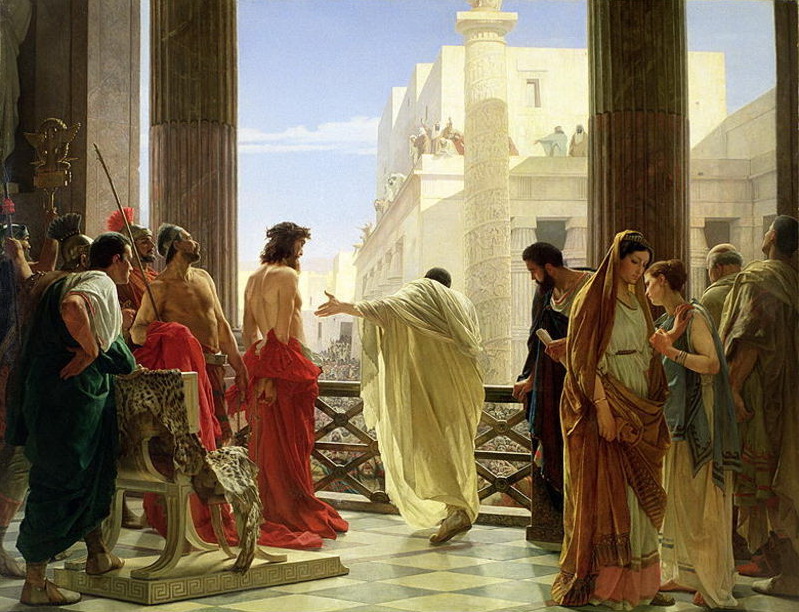
November 21, 2021; John 18:33b-37; Solemnity of Christ the King
In today’s gospel, Jesus and Pontius Pilate have a conversation. When you read the text, it flows easily enough, but there is a historical problem with this scene. Historians are confident that Pontius Pilate was bilingual. He spoke Latin which was the language of the Romans, and Greek which is the language of commerce in the Roman Empire. Jesus also seems to have spoken two languages: Hebrew, which is the language in which the Jewish scriptures are written, and Aramaic, which is the common speech of Jews in Palestine. So between the two of them, Jesus and Pontius Pilate knew four languages. The problem is they did not share one in common.
So how did they communicate as today’s gospel shows them doing? Perhaps they had an interpreter. We do not know. But this much is clear: Jesus and Pilate would have had difficulty in understanding one another because they did not speak the same language.
And the problem goes deeper because the difference between Jesus and Pilate is not only linguistic. It is also theological. When Jesus says, “My kingdom does not belong to world,” he is trying to tell Pilate that the two of them live in different worlds. Jesus lives the world of God’s kingdom, whose values and priorities are very different from those of the Roman Empire. When Jesus says that he has come to testify to the truth, he is telling Pilate that his truth is not Pilate’s truth. Jesus’s truth is not the domination and glory of the Roman Empire, but rather of the mercy and compassion of God. So Jesus and Pilate stand in stark contrast to one another. They do not speak the same language. They do not hold the same truths. They do not inhabit the same worlds.
The question that the gospel poses to us today is whose language do we speak? Whose truth do we uphold? Whose world do we call our own? In the gospel of John, Jesus prays that his disciples may all be one. So the language of Jesus is one of unity and communion. In Jesus’s language, success is not victory for some partisan group or political party. Success is not adding to the polarization that so marks our society. Success is finding common ground and promoting the good of all. The Holy Spirit is the Giver of Life, so the truth of Jesus enshrines the dignity of life. The followers of Jesus strive to protect life, both in the womb and on death row, because they understand that the unborn child and the hardened criminal are both valued in God’s eyes. Jesus spent his ministry proclaiming good news to the poor and to the outcast, so the world of Jesus is one in which economic policies not only protect the wealth of the successful but also take into consideration the widow, the unemployed, and those without sufficient health care. All should be able to share in the goods of society.
If we speak the language of Jesus, if we hold fast to Jesus’s truth, we show ourselves to belong to Jesus, to accept his world, his kingdom. That is the issue that is before us today. Pilate asks Jesus, “Are you a king?” The question the gospel poses to us is different and deeper. As we stand before Jesus, we must each ask ourselves, “Are you my king or have I chosen to follow another.”
